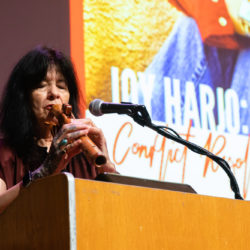Archive for June 2019
IDA Online Courses. Long Live Our Mother Week 7: Joy Harjo: Conflict Resolution for Holy Beings
MAY 15, 2019
Long Live Our 4Billion Year Old Mother:
black feminist praxis, indigenous resistance, and cultures of queer possibility
AFRICAAM 39 / NATIVEAM 39 / CSRE 39 / FEMGEN 39
Week 7: Joy Harjo: Conflict Resolution for Holy Beings
Joy Harjo’s eight books of poetry include Conflict Resolution for Holy Beings, How We Became Human: New and Selected Poems, and She Had Some Horses. Harjo’s memoir Crazy Brave won several awards, including the PEN USA Literary Award for Creative Non-Fiction and the American Book Award. She is the recipient of the Ruth Lilly Prize from the Poetry Foundation for Lifetime Achievement, the 2015 Wallace Stevens Award from the Academy of American Poets for proven mastery in the art of poetry; a Guggenheim Fellowship, the William Carlos Williams Award from the Poetry Society of America, and the United States Artist Fellowship. In 2014 she was inducted into the Oklahoma Writers Hall of Fame. A renowned musician, Harjo performs with her saxophone nationally and internationally, solo and with her band, the Arrow Dynamics. She has five award-winning CDs of music including the award-winning album Red Dreams, A Trail Beyond Tears and Winding Through the Milky Way, which won a Native American Music Award for Best Female Artist of the Year in 2009. Forthcoming in the fall of 2019 is a book of poetry from Norton, An American Sunrise. She lives in Tulsa, Oklahoma.
Course Description:
How can art facilitate a culture that values women, mothers, transfolks, caregivers, girls? How can black, indigenous, and people of color frameworks help us reckon with oppressive systems that threaten safety and survival for marginalized people and the lands that sustain us? How can these questions reveal the brilliant and inventive forms of survival that precede and transcend harmful systems toward a world of possibility? Each week, this course will call on artists, scholars, and organizers of color who clarify the urgency and interconnection of issues from patriarchal violence to environmental degradation; hyper-criminalization to legacies of settler colonialism. These same thinkers will also speak to the imaginative, everyday knowledge and creative healing practices that our forebears have used for millennia to give vision and rise to true transformation.

